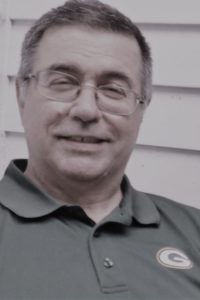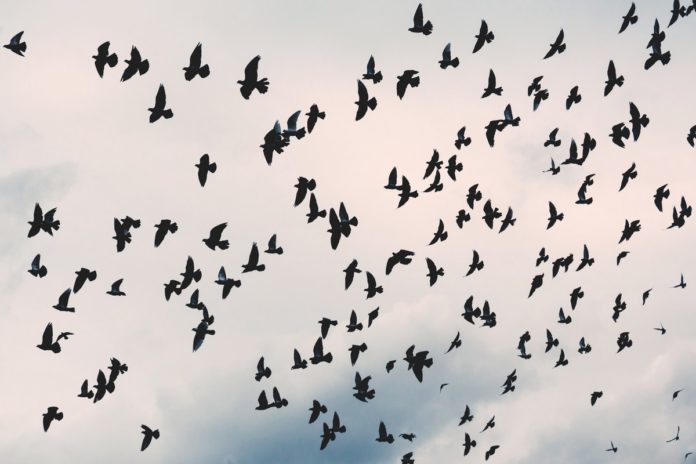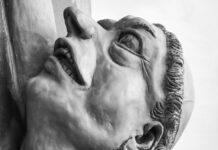The sun blazes against the cloudless fabric of blue sky, engraves into my consciousness the sickly yellow face of a diseased child. Including myself, most are thinking, “If only I could have been…” But to some that were it doesn’t matter anyway. Birds which sang with the first hazing take wing with the daylight, leaving songs in their nests. It’s the beginning of a dilemma: whether or not to believe in the birds, when there’s nothing else to do, and whether or not one increases the probability, if one refuses to believe in the birds, that a turkey vulture will appear suddenly out of a tree, swoop down and shit into one’s eye. Scavengers plod fat-bellied to their burrows. It is sprung! Some bit of wisdom I can’t remember made it all acceptable. Days (How many?) we’ve lain here waiting helplessly. Are the Non-Contagionists dead or merely dedicated? Only silence out of them, no matter how we gossip. What was Bendenick’s wisdom about this being Judgement Day? “Wisdom? Do I look like an encyclopedia?” The Murmuring Constituents respond, “World Book, Funk and Wagnall’s, Brittanica, Collier’s, Americanna…All provide knowledge. None wisdom.” “Swines! Such brains you’ve got. Then explain to me why we’re stuck here. Get us out of this if you’re so smart. Sodom and Gemorrah. That’s what we are.”
They’re saying there’s no proof of anything. No Divine Forecast. No indication of natural catastrophe. Obviously a disease of some kind. Heard of this in Africa. Bugged, like the Tsetse fly is to sleeping sickness. Millions of different varieties, any one of which is deadly. There’s such a thing as mutation. No evidence to the contrary when there’s none in favor.
“Talk to me, Bendenick,” I say. “I’m tired of waiting.”
“I don’t want to talk,” he answers me, “besides, it isn’t fair. All the others have to listen to us as well.”
“Who cares? It doesn’t matter. Pretend they’re not here.”
“Don’t be stupid.”
Above my head, out of sight, a flock squawks angrily, beating the branches with their wings, their intense cacophony – the continual rustling of leaves about to fly – like coiled scrap metal falling to the ground in a heap. First one, then several, then all at once they dart through my narrow stem of vision: a squadron of fighter/bombers dapple-marking the daylight. Apeneck Sweeney and a little of Hopkins. Weird birds, flying North for our Winter. “Da, Da, Da,” my stomach answers them with a rumble. A lazy dream of clouds drifts overhead shocking the ground with chill-dark.
Bendenick and I share between us the titles along with Williams, Raenie, Fitzwater (who thinks his name is ironic). The Constituents call us heretics. Barely breathing, the ground and their cold doctrines cuddled for lack of a warmer bedpartner, they don’t pretend strength in unity: they talk incessantly about everything they observe and a few things they only visualize. None of them strike me as scholars. Not that I would know the difference between a real one and an imposter, only everything they talk about I understand, I think, too easily. They sound like middle-aged men encircling a card table, speculating over the outcome of the ballgame on the televison in the next room. Like everyone else, they have been overwhelmed by an abysmal sense of gravity. They cannot rise. Their movements are so fragmentary, so restricted to the ground. They crawl in twenty directions at once without dreaming where an arm or leg will end up. Torsos and heads writhe in place, descending, digging themselves in a little deeper the more they struggle, down into the clay and rainwater. Still oxygen fills and deflates their breasts like a curse. Two days ago, they gave up trying to decide whether or not this was a miracle. Now more and more of the Murmuring Constituents opt for silence, joining the ranks of Non-Cons. It’s impossible to say how many there are left, since they never speak.
Our hearts beat. We don’t move. Consolationists like to quote Scripture, how well is a matter for argument. They hold on to what’s left, though it’s scarcely a word. They preach by some miracle we’ll all get put back together again and everything will be as it was before whatever happened made us this way. I hear their prayers, their hymns, sometimes more or fewer voices: Lynn from behind the counter at the corner grocery; Ed the housepainter who lives up the street; Jackie my next door neighbor’s ten year old daughter. I can’t help but think of them in context. I only visualize them in their natural habitats, contradicting one another. At night, their voices rock me to sleep and I dream about how life used to be when everyone was free to move around as he pleased, when we weren’t constrained by this mysterious fragmentation, which is all the more debilitating, I think, because it is undefinable. We know everything, some even think they know the cause, yet we’re helpless. Some want to deny it, insist it’s all fantasy, mass hallucination. It amazes me how they continue to deceive themselves, when from one day to the next they deteriorate. But they keep on, hungering more and more, their chests rising and falling as if by command, hurting with every breath, and I assume, their thoughts hurtling. They deny we have changed. A good percentage of these, I think must be crazy, jabbering just to suit themselves, complaining about the Wall Street Journal being late or piling up on their front lawns, carrying on half a conversation with someone who, if he could, would run away. It seems to me they’re much more vulnerable, the more they lose. They must die a little sooner than the others. I can’t help but envy them that. But I won’t jump track of my perspective. I’ve sworn to myself I will not die in ignorance. Sometimes I talk with my friends about it. They reassure me: they confirm my thoughts and observations, or disagree with me. Paradoxically, I feel most comfortable when they argue with me. It helps convince me I’m not seeing things. Still, how close we are to the crazy ones — The Incoherents as we refer to them — and I can’t help but sense the cold proximity of death. Then I burst into a sudden rage that lasts for several minutes pregnant with nothing but the awareness of motion. I crawl all over the field without any direction or purpose in mind. I only stop when I’m exhausted, or when I think someone watches me.
A good number of the Constituents have given up their argument, only now, instead of silence, I hear many of them praying as fervently as the Consolationists. I don’t like to speculate. I don’t know whether it’s out of desperation or if they are genuinely faithful. And my current situation compels me not to draw any conclusions. Perhaps it’s their only remaining option. Indeed, it is tempting to think the miraculous is possible, that in some way everything will right itself overnight, or that, in reality, everything remains as it was, only our perception differs. But in this too, they are handcuffed. They believe, yet at the same time, they know the fear within themselves. I see no advantage in turning to God out of fear. I would rather strip this whole life of its illusions, to one by one observe the things that are and really see them and know they are what I see and not something else. We are miracles after all, and these birds, for instance, what else could they be, squawking as they do? And this sun? This water puddling around the back of my neck? Is it any wonder I’m most content when I’m alone and in the woods?
They act as if they are unaware of themselves. But I know myself to be Empedocles, excepting that I’ve no place to jump. Perhaps I already lie broken on some promontory, trapped between the burning lake and the blue skies over Aetna, trying to squeeze every one of my thoughts into a moment in time while I still exist. A harried rope binds me still to the pit of my origin. I know others who’ve fled. I’ve read of many who’ve been successful, even great or terrible. Could it be that they too have come to this, but have escaped?
My friends pester me. What can I make of someone who agrees and disagrees with me practically in the same breath? I don’t blame them. We share our entombment. Still, the whole idea that one can know another human being here is ludicrous. What would even an embrace bring to us, when knowing one’s self is difficult enough? But I won’t start bantering absurdities and platitudes about the human condition. Suffice it to say, they’ve surprised me as often as they’ve bored me. Occasionally, one of my friends says something that bores and surprises simultaneously. For instance, Raenie who’s said “Morning again,” for the past three days, always at sunrise, with a despondency fully to be expected under the circumstances, but always somehow surprising. Raenie was such an imaginative fellow in college. I suspect it’s left over from back before whatever happened happened, back when he hit the snooze bar on his alarm clock six or seven times, had his breakfast of toast and coffee, sometimes eggs, kissed his wife’s cheek goodbye, and ran to catch the bus to where he worked as a parking lot attendant – such a job for Raenie, who was brilliant, at least among our little group of amateur politicians – reading Rimbaud translated from French in-between going to and from the cars, and always mispronouncing the author’s name in conversation, though I suspect on purpose. Then there’s Williams and Fitzwater, friends after so many years as mortal enemies: Fitzwater had an affair with Williams’ beloved now ex-wife. They pointed fingers across the street at each other every Saturday morning in the middle of watering their lawns, whispering to practically any passer-by, “There’s the man who…” Meanwhile Mrs. Williams had run off with a biker. Apparently neither of them satisfied her. Oh, the ladies in our neighborhood never needed any more to keep them yammering! But I am glad for Williams and Fitzwater, for their relationship to each other and to me as well, and for Raenie, for his optimism and his pessimism, and his opportunism, considering I’m a captive audience. They muddle my thoughts, or else they clarify things to such a degree I sometimes hardly believe I could ever contend with them. They are my friends.
At first, of course, the break from routine was exciting, if terrifying. I woke up that morning, felt my mouth full of stench and rot, but without any method of brushing my teeth, I soon forgot about it. Without having to wash or dress, without feeling compelled to read the Times, I was afforded a good deal more time to speculate over where I was and why, and how I came to be this or that which I had been. But even speculation bored me very quickly. In the life I recall I was a salesman, and I needed a product and someone to pitch to. I remember lying awake nights, looking out my bedroom window, fantasizing beneath a canopy of stars over potential marketing techniques, all of them brilliantly successful, and I never failed to congratulate myself. How distinct from other people, simply because I had the potential to be what others weren’t! Indeed, I was special: I was myself, and as such, I was quite remarkable, even blessed. I was unique, and it didn’t matter to me that everyone else was just as unique as I was. And all the others, their interests rivaling mine:quite the competitive world from which I had emerged, and the competition only inspired me to excel in every foreseeable imaginable way. I sold and sold and sold and sold and sold. I amended my personality so that at any moment, I might alter it to fit as if it were a suitcoat whatever other individual who seemed to represent for me an easy mark, a whale as it were. Soon enough I became the best salesman I ever knew, possibly the best that ever was, though, oddly, I discovered quite by accident, overhearing a conversation in the lunchroom where I worked, that my routine had been implemented everywhere, and practically every acquaintance of mine had, to some extent, “neutralized” his personality, in order to devote himself to the duty of selling, the responsibility of selling.
That turned out to be a day of great revelation for me. Why was I so brilliant while others were merely average? I began to look to other salesmen, to compare my accomplishments to theirs, not merely as I had in the past (in accordance with the company’s wishes), but with respect to my personal life. Was I happy? Did I enjoy the things in life I truly valued? Did my life have meaning (however so nebulous a word is defined by a man so spontaneous yet rational as myself)? Slowly, through a process of personal investigation, I discovered I was not superior. I succeeded at my job, but I had sacrificed my identity. I was everyone else’s man: anyone who wanted to buy from me. I started drinking, felt irritable. My next-door neighbor Bendenick’s father died, and he was suddenly rich. And I had nothing.
I often think of that replica in Milton’s hell of the Tree of Life and the apples that turn to ash when bitten into, and I can’t at times help but see myself a snake. I curl up my tail, crouch down low as I can, and spring! And then the bitterness, choking, my mouth so dry I can’t spit cotton, most of all envy and regret for what has been my sinfulness physically manifested. It’s too easy to assume I’m damned or will be. To me, that suggests I am yet capable of self-determination. All I’d have to do would be repent, and though my sins are no more remarkable than anyone else’s, excepting of course that they are mine, and as such I suppose I’d be obligated to account for them, I am yet a man and prone to imperfection, error, selfishness, pettiness, pity, pathos. But considering all of the others here from my neighborhood, many of whom insist that the Lord is on the verge of forgiving them, or that they have already been forgiven, I only conclude it wouldn’t do me any good to beg. I won’t change. I’d still be here, and wherever this is, it isn’t heaven and it isn’t hell, despite that nearly all of the Consolationists insist it’s either one or the other.
Here there is nothing upon which to focus my attention, except for those things which vary only slightly from one moment to the next, like hunger. It is difficult to remain alert. I struggle just to keep track of the time of day and where I am. The day proceeds in its delirium, only it is more excruciating than I would ever have imagined. My conscience will not stop berating me, insisting it is all my fault, and yet, it remains completely aware of everything happening. My thoughts proceed as though inevitably, like furniture produced by a machine, one piece after another, uniform and stripped of detail, fully functional, but ridiculously unoriginal, and therefore useless. For instance now, I remember what it was like when I was a child and fell over the side of a speeding motorboat, lacking a life preserver upon which to cling, and envisioning some vast expanse of time as the motorboat circled about, nearing me, threatening to broadside me. The nearer the boat came, the more slowly it seemed to approach, the harder my legs and arms kicked and splashed, the more my heart and adrenaline pumped, until suddenly it occurred to me that time would stop entirely…then just as suddenly it was over with and I was plucked from the water, rescued. It is the same sort of gap in time which everyone here is experiencing with respect to what has happened. In a sense, we’ve all been marooned only no one knows exactly how, and that leads us to believe our experience is universal, and that one explanation of our whereabouts would suffice for all of us. We have all tried to remember precisely the very last thing each of us did before this (whatever it is) happened, but of course, each of us has found that impossible. Like the old brain teaser about the wall and the step that’s cut in half and cut in half, again and again, many of us still struggle to remember what we said, what we were thinking a minute before, a second before, and whether or not there was anything “unusual” about it. In the morning, we awaken from our dreams and recognize the ground, the sky, the rising sun, the cries of birds, the scavengers, Raenie’s disgust. Where one life stops, another begins, for each of us here, but in-between is nothing discernable. The gap widens, becomes harder and harder to bridge: some Constituents already insist the past was an illusion and we have always been here, as if our former life were a kind of parable, like the story of Adam and Eve.
The second day I started talking to Bendenick, even though I’d never paid much attention to him before his inheritance. In retrospect, I have to think my tendency to ignore him was one of the reasons I had once considered myself to be a model neighbor. In reality, we only gave ground to snatch it back at the earliest best opportunity. He was the only Jew in our neighborhood, and every Saturday he and his family, looking like little caterpillars anticipating making their chrysali, piled into their station wagon and darted off across town just for Temple. For six years, this ritual was strictly maintained, until one day when Bendenick learned he had inherited a great deal of money from his father. When I heard the news, it seemed only natural I should despise him, having worked all my life to be merely comfortable, while he was suddenly rich. I was alone. I hadn’t any father, not a rich one anyway, and he had his family, even his extended family. I suppose it would not be right to deny that I too had a family, but in truth they were never more than an inevitability, something that happened, like defecation. If they found me, how would they avail themselves of being anything other than the caricatures I’ve always thought them to be? More than likely, they would all fall away in a dead faint, the minute I opened my mouth to speak to them. Alive? Is he really?
But back to Bendenick and his inheritance, as that is the chief impetus for my having mentioned any family in the first place, I would only like to add that I wasn’t at all jealous. After a few days of adjusting to the situation, I held no particular grievance toward him. Actually, it wasn’t much of a surprise: I knew all along he was heir to a fortune even while I was busy ignoring him. One can’t live next door to a person for years without learning something about them through common gossip. I suppose, over time, I’d grown acquainted with the idea of Bendenick’s prosperity. It was always lurking somewhere in my unconscious mind all the while I’d known him, so that finally, when the inevitable happened, when his father booted off from tuberculosis, just as everyone had always expected he would, the little thought, the kernel suddenly burst into germination. It wasn’t long before I felt I was walking around with a seedling sticking out of the top of my head. It didn’t help matters that my gardening coincided with the self-discovery I just mentioned and a subsequent and rather dramatic drop in sales. There was a bit of uneasiness involved, of course, but it wasn’t something one wouldn’t expect, considering Bendenick and I were now divided according to social class. It all stemmed from the fact (pun intended) I could never quite ignore him in exactly the same way after his rise to affluence. We spoke about his father: again and again, I expressed my condolences. He described the funeral to me in some detail, all the little children running and throwing things in the yard in which he’d grown up, the buffet dinner, relatives he hadn’t seen in years. I told him it reminded me of my own mortality. We smiled, shook hands, small talked. Our relationship grew to what could have been described as friendly, warm, half a dozen other adjectives, perhaps cordial is the best, most accurate. We never crossed paths without at least acknowledging each other’s presence with a respectful bow of the head or salute or other similar gesture. Last Winter, I even on occasion shoveled his walk while he was vacationing in Rio.
Earlier this year, he decided he would move to a different suburb, something overlooking the Lake where the air quality was better and there was less pollen. Though I have no idea what possessed me to do so, I proposed to help him move. I remember standing in front of him, feeling myself something of an automaton, hearing my mouth consenting to do this and that service for him, meanwhile obstinately refusing any sort of reward whatever: the truck and dolly rental, the stove, the sofa bed, and the refrigerator, all this I readily volunteered to take upon myself as if it were my own responsibility. “And remember to fasten securely whatever could spring open. A door. A hinge. You don’t want anything damaged during transport, do you?” “What about the piano legs? Should I take them off or leave them on?” “Oh, take them off, definitely. Yes, they’re very fragile, those legs. They’re not meant to stand up against any sort of shifting side to side.” I insist, I never wanted his approval. I wanted only to know how he lived, to discover how he succeeded, in the hope of providing for myself an opportunity to imitate him through sales and salesmanship.
This was the beginning of what I like to refer to as my gastronomical hardship period, which was marked by a great many rumblings and churnings, and other intimations of seasickness. Days, I staggered about in a dizzy dreamlike state, wrestling with the worst slump of my career in sales, repeating the same song and dance routine, over and over, filled with promises and regrets, to half a dozen supervisors. Nights, I loaded box after box into the U-Haul, kissing its tranny as it drug itself and its contents across town, and suppressing the sensation of having three days worth of eating backed up in my colon, meanwhile bouncing in the springless truck and seeing double. Even with the aid of a laxative, it held on for another twelve hours, until the following morning I called in sick to work. Sweating and straining, I passed what felt like a lumpy bowling ball of chiseled granite, which, on inspection, I found to be latticed with several tiny veins of dark red. I could scarce describe to you the bizarre tale of how I got my stubborn leaky old American Standard to finally choke down that rock after flooding, fouling my tile floor with dismal wads of shredded, soaked and soiled paper.
All of which, of course, has no bearing whatever on the present situation, except that it is the last thing I remember, culminating with Bendenick’s laughter, some absurd reminiscence of the past, a substitute for what the other individuals who are trapped with me experience as regret for having once been happy, regret for what Thoreau might have called, “having actually lived.” Perhaps, I am now more than ever inclined to listen to Bendenick when, prior to his inheritance, I might have tended to ignore him. Bendenick and I have befriended each other, truly and for the first time, now that we are both incapacitated, fragmented. It seems he has acquired a certain unbreechable status with respect to myself. I cannot hear him without realizing that having once been weak before him, I am in a sense obligated to remain so, at least in part, for as long as I am subject to his diatribe. Bendenick’s words are no more profound than anyone else’s, but to his credit, he doesn’t brag. He knows better than to speculate over where he is in the hope of reaching a better place. It comforts me that his character isn’t boastful and that he doesn’t think himself more intelligent than he actually is. He has always been kind to me except for that one incident for which he has apologized. “You idiot!” he laughed, “if you’re lonely, get a wife. What’s the matter with you?” Now perhaps he understands.
That’s how I met Williams and Fitzwater. We were each without a spouse, an embarrassing condition for men who are middle-aged and living among dozens of families. Before this tragedy, we never spoke to each other. We walked with our heads down and carried our shame about with us as if it were anchored to our shoulders. Those among whom we resided viewed us as curiosities, freaks, worse even than the handicapped who couldn’t help themselves, cowards, dirty old men, curmudgeons. Under the present circumstances, we three have quite naturally gravitated toward each other. If one has to be miserable, it’s best not to be miserable alone. Besides, what choice did we have? When a man gets divorced, or if he has never married, he has no choice but to become a philosopher: that’s his life. It’s not as if we could cover our ears and not listen to each other’s words. The case is different for Raenie. He and I went to college together. Afterwards, we remained friends but at a distance, spoke on the phone occasionally, and never spent any time together. His wife couldn’t stand the sight of me, always used to tell him wild imaginary stories of how I lusted after her and her friends, none of which were true. I might have asked one or two of them out (and never his wife, by the way, for she was far too ugly), but that was my mistake. I was lonely. I should have guessed they’d be cruel enough to grandstand their independence in front of Raenie. After all, what was one man’s reputation compared to their fun? And I wasn’t handsome enough to make them forget their ideologies…That’s just speculation, however. Who knows why they rejected me and went to Raenie? Perhaps they were frightened. Perhaps Raenie provided for them a sense of security, him being married, while I had the opposite effect upon them. Still, that’s no reason to deprive me of my best friend. On his wife’s insistence, Raenie had nothing to do with me, outside of phone conversations which started out monthly, lapsed to bi-monthly, then faded altogether away. But for the last three days we’ve been re-united, Raenie and myself. His wife has disappeared, as have her friends: we have to assume they’re either dead, converted to Non-Contagionism, or else they’re wondering where we are. I’m so happy to be reunited with Raenie, but I never let him apologize. I keep telling him it isn’t necessary, because I want to perpetuate in him a sense of guilt which for me is more than compensatory. I particularly enjoy hearing him complain in the mornings about his back. Figuratively speaking, I assume he is talking about the past. It pleases me immensely to think his “back” is hurting him.
Eventually, all of us who are trapped started talking about where we are and what we’ve been reduced to without obsessing over explanations for what has happened. We invented the titles, categorized ourselves, tried to interpret the situation logically, with whatever logic there was at our disposal. We shared our ideas and in this way, we avoided hysteria. We passed the time. We put the titles to use and before long everyone belonged to one or another of the following four:
1. The Murmuring Constituents discuss with all the assuredness
of laymen who fancy themselves experts and know their
audience (which is no better educated) will not risk
correcting them Physics, Biology, Theology, Psychology, half
a dozen other -ics and -ologies, and especially History.
2. The Consolationists believe in the Book of Revelation, but
also in the healing power of Confession and Absolution. They
continually ask for and no doubt receive forgiveness for
their sins, but they regret the fact they are no longer
capable of sinning except with their tongues.
3. The Non-Contagionists often exercize in synchronized
breathing. They cannot stand the idea that others may know
they are suffering, so they disguise themselves, remaining
silent until their pain can no longer be controlled. Then
they join the ranks of…
4. The Incoherent Ones, comprised of individuals from
all the other groups who’ve gone mad. They scream until death silences them.
But even this became old very quickly, and now we recognize only an inability to move efficiently, and an attitude about whatever it is we’ve decided has happened. Already, we’ve progressed in our new world: we’ve moved a step closer toward eliminating the titles. Of course, I wouldn’t argue that we no longer discriminate. After all, my friends and I were not the only ones who lived in our neighborhood. A black man suddenly dispersed among us would be known by all by the sound of his voice, and some of us would undoubtedly despise him, at least at first. But we recognize in ourselves all of the qualities of the four titles at different times. We see ourselves as multi-faceted individuals, as capable of great diversity, even within our own culture. In fact, it is even possible we would be willing to accept a black man, if he were forced upon us.
I want very desperately to believe in the birds, in their incessant squawking in the trees, to believe in the sunlight which keeps getting hotter and hotter as we approach mid-day, to believe in the mud which is drying now, crusting about the saucers of my ears. But what about the storm? Must I also believe in that which frightens me? The clouds? The artificial darkness?
There are flies, of course, and other scavengers:Bendenick when he talks too much, or any of the others making a nuisance of himself or herself. These can only be avoided inside a domicile, and even then they are usually only controlled. Oddly enough, I feel a sense of truly living while I’m lying here. If pain is living, then I’m being eaten alive. I’m not dead yet. Sometimes I’ll reach up and try to scratch myself as if there’s any sense to that at all. Even before when I was fully alive, it was only temporary relief. I’d scratch myself all the more the following day, or even minutes later, sometimes, depending upon what I was scratching.
I’m lying in my own shit. All in all, I’d say things haven’t changed much.
I don’t want to speculate about everlasting life, heaven and hell, Nirvana, Elysium, whatever. What serious interest can I have in something if I haven’t seen or touched it, if it obstinately refuses to show itself to me for what it is? Does that make me a hypocrite, or just sensible? And can man be the right word for it? Have I not evolved into something else? One thing I do understand is that we will continue either to die or to be silenced, to pray, sing or cry out in madness. But what strikes me as odd is that I don’t believe I have a choice regarding the titles to which I am bound, because, from one moment to the next, I’m not really aware of who I am. One minute, I’m a Constituent, the next a Consolationist, and yet even my contradictions are perfectly sensible, given the context.
When it rains, I close my eyes. When the wind blows and it is cold, I shiver. In darkness, I sleep. If only I could run in a circle and flap my arms. Then I could swear there is nothing at all changed.
About the Author

Mark Putzi received an MA in Creative Writing from the University of Wisconsin -Milwaukee in 1990. He has published fiction and poetry in numerous small press magazines including The Cape Rock, the Cream City Review, Queen Mob’s Teahouse, Meniscus and Griffel. He lives in Milwaukee and works as a retail pharmacist.
















